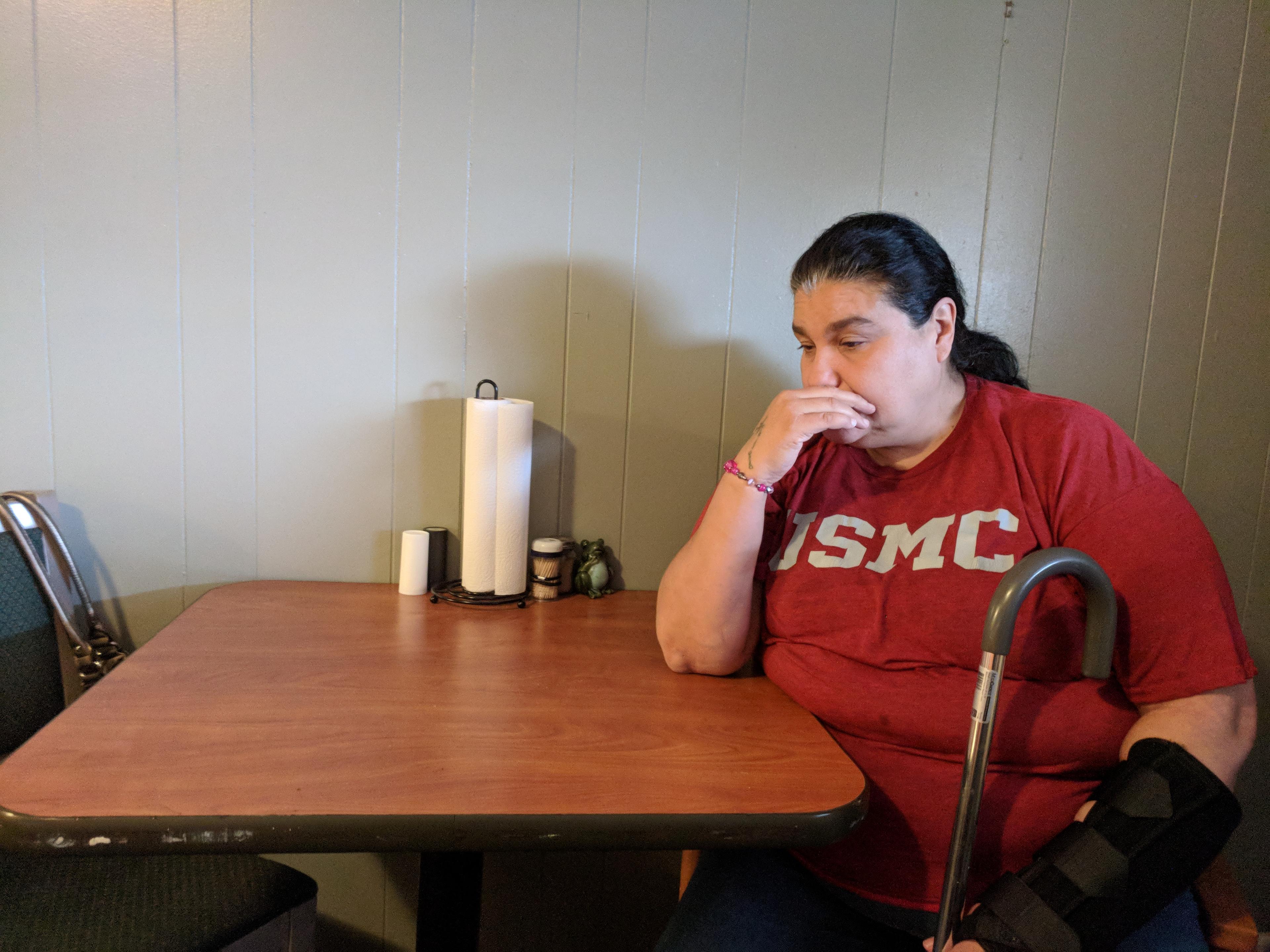

Published April 30, 3:32 p.m. | Updated May 3, 6:06 p.m
Mary Martinez has a hard time talking about her old apartment without getting angry.
Until last January, Martinez lived in a one-bedroom apartment in Aurora. The unit seemed ideal until a boiler leak flooded her bedroom. After that, she said mold colonized a closet. The heat cut out for over a week. Then, a second leak dissolved her kitchen wall into white mush.
After months of haranguing her building’s maintenance department to little avail, she decided the apartment wouldn’t be a safe place to recover from hip surgery. Martinez moved into a motel in Lakewood, where she’s lived for the last few months.
"My rent was paid every month. $1,100 every month. I was not late. It was there. And I finished off my lease," Martinez said.
In the course of preparing this story, managers at Martinez's old apartment, the Courtyards at Buckley in Aurora, were left two messages seeking comment. On the third attempt to reach them, the reporter was informed that the manager would not comment.
After publication of this story, the company's lawyer said that the apartment was actually rented by Mary Martinez's boyfriend and that her name was never on the lease. Martinez said she believed she was added to the lease partway through the year. The company also disputes the frequency and severity of the maintenance requests made for the apartment.
Stricter Deadlines For Landlords
Martinez is now part of a coalition called Colorado Homes for All. The collection of tenants and advocacy groups is pushing a bill that would tighten Colorado’s health and safety standards for rental units. Advocates believe it would give tenants more leverage in a growing battle for renters’ rights.
State Rep. Dominique Jackson is one of two Democrats pushing the bill. As housing tightens in Colorado, she worries landlords have come to see renters as expendable.
"There are so many people across our state, people that I have been hearing from, that have been living in unsafe and unsanitary conditions," she said. "And they cannot afford to move."
Jackson’s bill would amend a current law known as the "warranty of habitability." In essence, it requires landlords keep their properties fit for human occupation. The bill also adds mold as a safety violation. When landlords fail to fix a furnace or patch a leaky roof, current law requires they address the problem within a "reasonable time."
The new legislation would define "reasonable" by giving landlords a set of deadlines. After receiving notification from a tenant, landlords would have a day to address anything hazardous to human life. A broken fridge, stove or oven would need to be repaired in three days. Landlords would have ten days in all other cases.
"The set times seem arbitrary," said Nancy Burke, vice president of government affairs at the Apartment Association of Metro Denver, which represents landlords. "Twenty-four hours to fix a dishwasher or refrigerators is not always something landlords can always control."
Rent Strikes Strike Back
Perhaps the most controversial provision would allow tenants to withhold rent when their home is in disrepair. Before doing so, renters would first have to get a contractor’s quote and could only withhold as much as the repairs would cost.
Andrea Chiriboga-Flor, a bill advocate and an organizer with 9to5 Colorado, said that piece has strategic potential for the renters’ rights movement. If tenants could withhold rent, she believes they could organize rent strikes when faced with a severe set of maintenance issues.
"So by going on rent strikes, they’d be able to say. ‘Here are our demands. You have to fix everything and cap rent at this price for the next five years,'" she said.
The 1930s tactic is coming back into vogue. Tenants in Los Angeles and Toronto have organized recent rent strikes. In many of the cases, renters managed to stay in the units while negotiating agreements for repairs and slower rent increases. Some even gained the ability to collectively bargain future leases as a renters’ union.
That’s not something attorney Deborah Wilson thinks should be welcomed in Colorado. As a lawyer who tends to represent landlords, she said renters already use maintenance issues as an excuse for not paying rent.
"My concern is that rent strikes are going to be staged by tenants who don’t have a legitimate health and safety issue," she said. "In my experience, the vast majority of these claims are meritless."
An Uphill Battle
Under current law, renters can bring up maintenance issues as a defense in eviction court. But many tenant advocates believe the deck is stacked in favor of landlords. That’s because the current statue presumes a landlord did not retaliate if they raise rents or seek an eviction after a renter complains about a property.
The new bill would strike that presumption. It would also allow tenants to hold landlords accountable to the safety standards in county or small claims court, rather than just district court.
Those changes could force landlords into more court battles, according to Republican state Rep. Susan Beckman. She worries "the overreach will cause costs across the board for renters to increase."
The measure is scheduled for its first public hearing Tuesday. There's a chance it makes it through the House, where Democrats hold power, but it's unlikely to survive Republicans in the state Senate. Regardless of the bill's first outcome, advocates hope the bill will be an opening volley in a growing battle for renters’ rights in Colorado.
Editor's Note: This story has been updated with comment from the legal representative of the Courtyards At Buckley apartments. Response to attempts to contact apartment managers before publishing were met with no comment.









